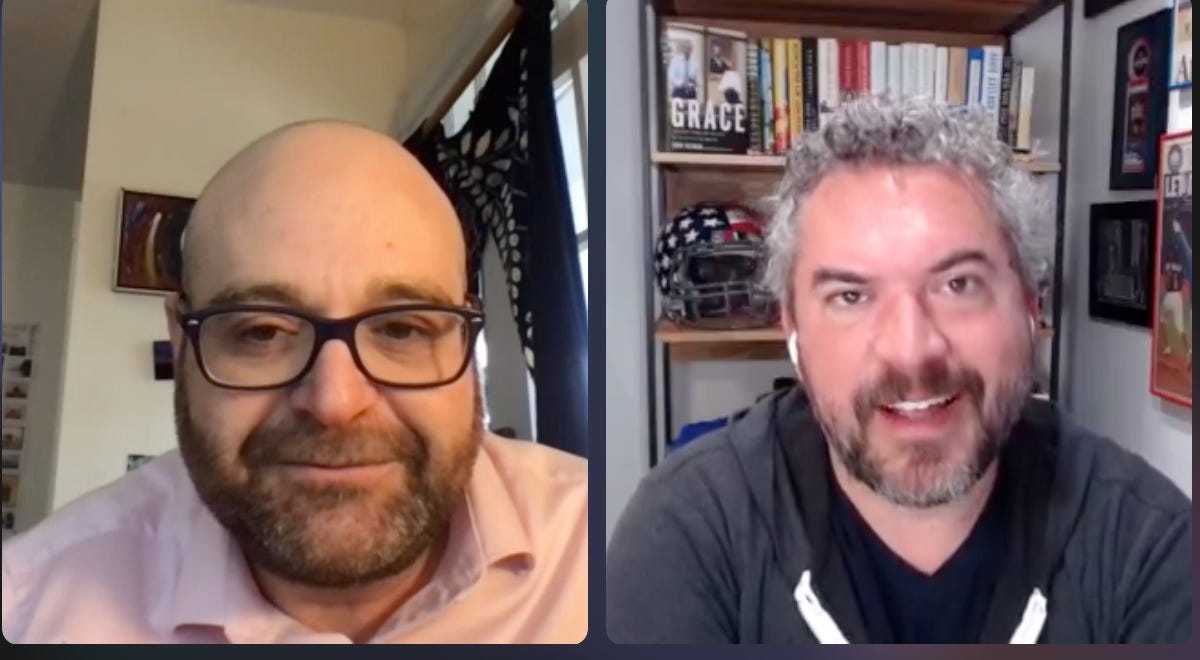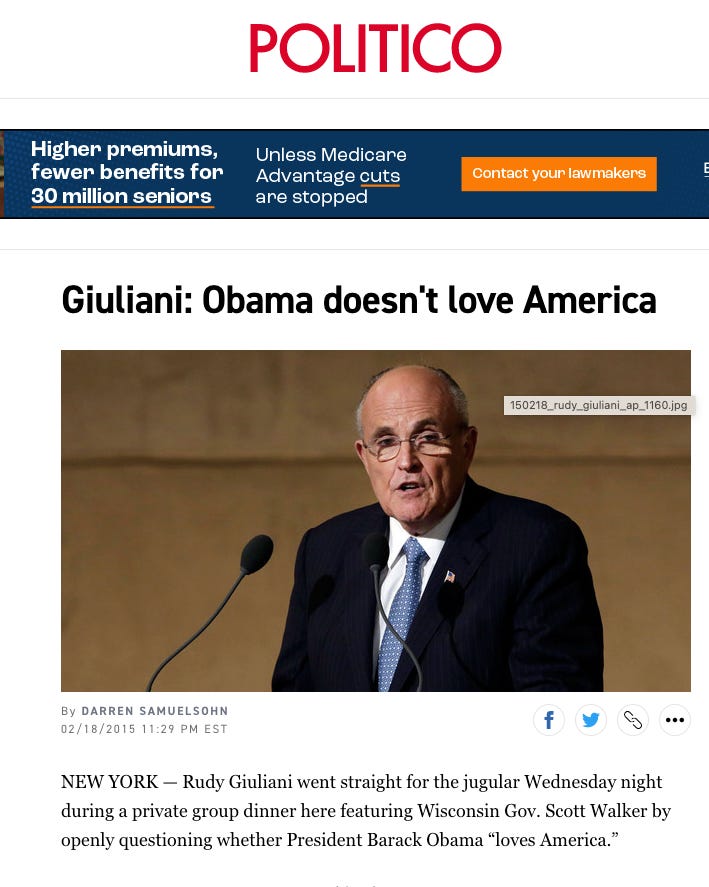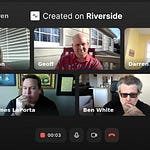I’m Darren Samuelsohn, and welcome to a special Tuesday edition of The love, journalism Show with my guest, former Obama White House chief speechwriter Cody Keenan.
First time here? Please sign up to love, journalism, my free newsletter full of insights, interviews, ideas and inspiration from a journalist who has been reporting and editing writers for 30+ years. Podcasts usually come out on Saturdays. I write bonus posts too.

President Barack Obama’s March 2015 speech commemorating Bloody Sunday’s 50th anniversary would have sounded a bit different had it not been for a pretty short article I’d written a few weeks beforehand for Politico featuring provocative comments made by one Rudy Giuliani.
That’s according to Obama’s chief White House speechwriter, Cody Keenan, who I interviewed this morning for a special edition of The love, journalism Show, eight years to the day of that historic presidential address commemorating the 1965 civil rights marches from Selma, Alabama, to the state capital of Montgomery.
In our interview, Keenan described the tension he faced knowing six weeks ahead of time he’d be working on drafts of the speech Obama was scheduled to deliver on March 7, 2015. While he felt “an amazing luxury” to have so much time to write, expectations were high given the symbolism of the nation’s first Black president speaking in front of the Edmund Pettus Bridge and paying tribute to a seminal moment in history.
Early versions Keenan wrote weren’t ready for primetime, he recalled, and Obama even told him at one point he only “took a half swing.” Then, two days before Obama flew on Air Force One to Alabama, a late winter snow storm brought Washington, D.C., to a standstill, and Keenan got nearly unfettered access to the president for them to work together on the final draft.
That’s when Keenan leaned on a technique that had worked before to help inspire Obama into some new freeform verbiage they could capture on the page.
“I always found that a good way to kind of shake loose some emotion from him is to get him all hopped up on, you know, whatever the political idiocy of the day was,” Keenan recalled. “Enter Darren.”
Time to back up and put into context why I suddenly and without knowing it would become part of this story through a completely unrelated series of events. For love, journalism readers, this next part will sound familiar because I wrote about it here just a few weeks ago.
About six weeks earlier, on Ash Wednesday in 2015, I’d been on a Politico Magazine assignment for a long-form profile story about Stephen Moore, a economist and Republican policy wonk who was trying to find his way into a job working for one of the fledgling 2016 presidential campaigns.
Traveling with Moore to New York, I scored an invite to an exclusive dinner he was co-hosting with about 60 right-leaning business executives, conservative media types and then-Gov. Scott Walker of Wisconsin, an early leader in the GOP nomination battle to succeed Obama, as the featured speaker.
Without any advance warning, the night took a dramatic turn when Rudy Giuliani showed up and took the microphone to make some extemporaneous remarks questioning Obama’s patriotism.
“I do not believe, and I know this is a horrible thing to say, but I do not believe that the president loves America,” Giuliani said. “He doesn’t love you. And he doesn’t love me. He wasn’t brought up the way you were brought up and I was brought up through love of this country.”
Giuliani had much more to say too, but the gist of all this is that my 593-word article breaking the news of those specific comments did more than just travel around the world, prompt plenty of controversy and serve as a launching pad for a Saturday Night Live cold opening skit.
Giuliani became the subject of an Oval Office conversation when Keenan brought up “America’s Mayor” and the love America comments in order to goose the president into the right state of mind for late-stage speechwriting.
“Who gives a fuck what Rudy Giuliani has to say?” the president replied, according to a quote in Keenan’s book, “Grace: President Obama and Ten Days in the Battle for America.”
Then Obama took the bait. “But it does offer an idea worth taking on.”
The president and his speechwriter started riffing on the notion, Keenan told me, that they could “tell the fuller, truer story of America, this is a big, messy country that's full of contradictions and we've made mistakes, but we also, what really actually makes us exceptional is that we have the ability to change and that it's often spurred on by nameless, faceless voiceless Americans, who love their country and believe they can change it.”
Both former Chicago residents who looked askance at how DC couldn’t handle any amount of snow, Obama and Keenan that day would go on to share five drafts between themselves. “Which had never happened before and would never happen again,” Keenan recalled. “Each one better than the last. And we just knew that it was a good speech, which was also rare that we would know that. I remembered he emailed the night before the speech. He was like, ‘This is great. I’m really proud of it.’ And that’s just something that never happened.”
You can listen to Obama’s long riff on what it means to him to love America about two-thirds of the way through the full 32-minute speech. It starts when he references the American citizens throughout history who have helped change the trajectory of the country. John Lewis, the late Georgia congressman who 50 years earlier had been severely beaten while leading the Selma marchers, is seated just to the president’s right, looking on.
Reflecting on the whole thing eight years later, Keenan explained that Giuliani had pretty much walked right into Obama’s Selma remarks by opening up a conversation that allowed the Democratic president to make history relevant to the current battles in Washington and around the country over policies restricting voter access to polling places.
“We were looking for a little grit. You know what the speech kinda needed was a foil beyond, you know, the Bull Connors of the world, and Republicans who would come to pay tribute and then block the Voting Rights Act anyway,” he said.
I’ll admit that at the time of Obama’s Selma remarks I missed the link back to my Giuliani story. The president didn’t give me or Politico any kind of specific shoutout. I was head down anyway writing the Moore profile, and my beat had me bouncing all over the place across a wide range of policy topics. I didn’t make the connection until recently when I revisited the fallout from Giuliani’s comments for my new Substack and a good source suggested I chat with Keenan.
When we did finally connect today, Keenan added a couple of additional points of context.
First: “As always, Obama would have lifted it somewhere it needed to be. But your story made it a lot easier by just giving us that. So, thank you. But yeah, without it we would have had to find some other, I don't know if he would have come up with the whole, you know, what it means to be an American argument. Maybe? But it might have been a little less pointed.”
Second: There really aren’t many presidential speeches that are remembered beyond the delivery date. “Your piece,” he added, “just happened to inspire one of them.”
#30#
Tune in Saturday for more from my Cody Keenan interview on the next edition of The love, journalism Show. He talks about what goes into being Obama’s wordsmith and shares memories from the Chicago Cubs visit to the White House to celebrate their 2016 World Series championship just days before the president’s second term ended.















